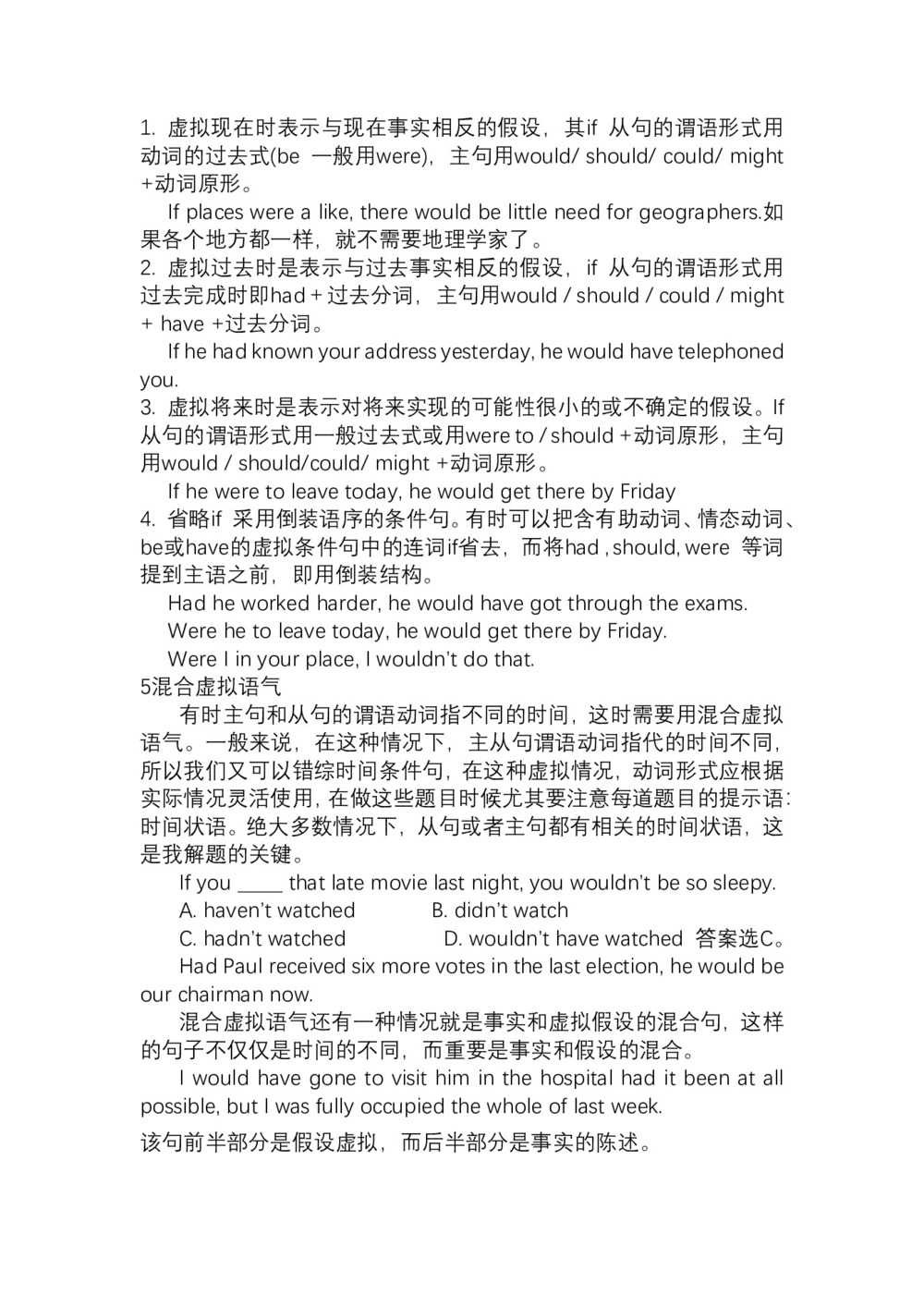
1. 虚拟现在时表示与现在事实相反的假设,其if 从句的谓语形式用动词的过去式(be 一般用were),主句用would/ should/ could/ might +动词原形。
If places were a like, there would be little need for geographers.如果各个地方都一样,就不需要地理学家了。
2. 虚拟过去时是表示与过去事实相反的假设,if 从句的谓语形式用过去完成时即had+过去分词,主句用would / should / could / might + have +过去分词。
If he had known your address yesterday, he would have telephoned you.
3. 虚拟将来时是表示对将来实现的可能性很小的或不确定的假设。If从句的谓语形式用一般过去式或用were to / should +动词原形,主句用would / should/could/ might +动词原形。
If he were to leave today, he would get there by Friday
4. 省略if 采用倒装语序的条件句。有时可以把含有助动词、情态动词、be或have的虚拟条件句中的连词if省去,而将had , should, were 等词提到主语之前,即用倒装结构。
Had he worked harder, he would have got through the exams.
Were he to leave today, he would get there by Friday.
Were I in your place, I wouldn't do that.
5混合虚拟语气
有时主句和从句的谓语动词指不同的时间,这时需要用混合虚拟语气。一般来说,在这种情况下,主从句谓语动词指代的时间不同,所以我们又可以错综时间条件句,在这种虚拟情况,动词形式应根据实际情况灵活使用,在做这些题目时候尤其要注意每道题目的提示语:时间状语。绝大多数情况下,从句或者主句都有相关的时间状语,这是我解题的关键。
If you _____ that late movie last night, you wouldn't be so sleepy.
A. haven't watched B. didn't watch
C. hadn't watched D. wouldn't have watched 答案选C。
Had Paul received six more votes in the last election, he would be our chairman now.
混合虚拟语气还有一种情况就是事实和虚拟假设的混合句,这样的句子不仅仅是时间的不同,而重要是事实和假设的混合。
I would have gone to visit him in the hospital had it been at all possible, but I was fully occupied the whole of last week.
该句前半部分是假设虚拟,而后半部分是事实的陈述。
Your math instructor would have been happy to give you a make-up
-
相关教案下载
- 12018-2019学年度人教版选修六Unit1ArtPeriod4Grammar学案 (2页word版)
- 22019-2020学年度人教版选修六Unit1ArtPeriod2Language points教案(11页word版)
- 32019-2020学年度人教版选修六Unit 1 ArtPeriod5Using language教案(3页word版)
- 42019-2020学年度人教版选修六Unit 1 ArtPeriod1Warming up and reading教案(9页word版)
- 52019-2020学年度人教版选修六Unit 1 ArtPeriod3Learning about language教案(11页word版)
- 62019-2020学年度人教版选修六Unit2 PoemsPeriod4Grammar教案(2页word版)
- 72019-2020学年度人教版选修六Unit4Global Warming Period4 Grammar教案(8页word版)
- 82019-2020学年度人教版选修六Unit5 The power of naturePeriod4Grammar教案(5页word版)
- 92019-2020学年度人教版选修六Unit 1ArtPeriod1Warming up and reading学案(13页word版)